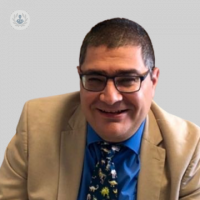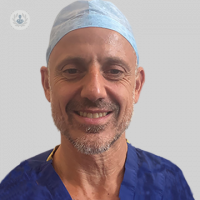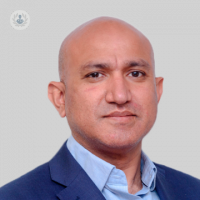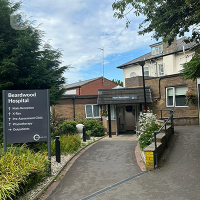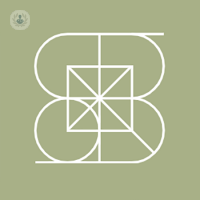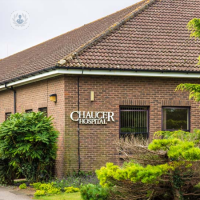What is facial pain?
Facial pain, or orofacial pain, refers to any kind of pain or discomfort in the area of the mouth and face. Often, the pain will present in the region of the trigeminal nerve, which is the nerve that supplies the frontal part of the head and divides into the ophthalmic, maxillary and mandibular nerves.
The pain may be mucosal, dental, or masticatory. Mucous orofacial pain is usually caused by tobacco, alcohol, or dentures. Dental pain usually originates from decay, and masticatory pain is related to bruxism, joint injuries, and loss of teeth.

Prognosis
The causes and symptoms of facial pain are highly variable, so there is no exact prognosis as this will depend on each case and how the patient progresses with treatment. Despite this, there are several techniques and treatments that allow pain relief and allow patients to continue with their daily life.
Symptoms of facial pain
Symptoms of facial pain reside mainly in the facial and oral area, causing headache or jaw pain, clicking when opening the mouth, difficulty opening or closing it, the feeling of mandibular dislocation, worn teeth and nasal symptoms such as a runny nose or nasal congestion, amongst others.
How is facial pain diagnosed?
For facial pain to be correctly diagnosed, the specialist would assess the clinical history of the patient and, on occasions, request other complementary tests such as X-rays and an MRI scan.
What are the causes of facial pain?
The most common causes of facial pain are:
- Burning mouth syndrome
- TMJ disorder
- Neuralgia
- Headaches such as migraine and tension headache
- Periodontal disease
- Traumatic injury
- Rhinosinusitis
- Eagle syndrome
Facial pain can have varied symptoms that can be confused with other diseases.
Can facial pain be prevented?
The prevention of facial pain involves trying to avoid its main risk factors such as tobacco, alcohol and tooth decay, amongst others. It is important to follow a healthy lifestyle and brush your teeth frequently to maintain good oral health.
Treatment for facial pain
Treatment of facial pain will depend on each case, although the specialist usually uses techniques with intraoral devices such as splints, RFA, surgery, manual therapy with physiotherapy, tension control techniques, orthodontic treatments, and prosthetic reconstruction. The final objective of the process is functional, it will try to regain the functionality of the jaw and to fight pain.
Facial pain medications
The medication for the treatment of this problem will always be according to the prescription of the specialist who takes the patient's case and history into account. Medications aim to relieve pain and allow the patient to continue with their daily life as normal.
Which specialist treats you?
Facial pain can be treated by specialists in dentistry, maxillofacial surgery, ENT specialists and pain medicine specialists as it affects the area of the mouth and face.
11-04-2014 03-20-2024Facial pain
Professor Panayiotis Kyzas - Oral & maxillofacial surgery
Created on: 11-04-2014
Updated on: 03-20-2024
Edited by: Sophie Kennedy
What is facial pain?
Facial pain, or orofacial pain, refers to any kind of pain or discomfort in the area of the mouth and face. Often, the pain will present in the region of the trigeminal nerve, which is the nerve that supplies the frontal part of the head and divides into the ophthalmic, maxillary and mandibular nerves.
The pain may be mucosal, dental, or masticatory. Mucous orofacial pain is usually caused by tobacco, alcohol, or dentures. Dental pain usually originates from decay, and masticatory pain is related to bruxism, joint injuries, and loss of teeth.

Prognosis
The causes and symptoms of facial pain are highly variable, so there is no exact prognosis as this will depend on each case and how the patient progresses with treatment. Despite this, there are several techniques and treatments that allow pain relief and allow patients to continue with their daily life.
Symptoms of facial pain
Symptoms of facial pain reside mainly in the facial and oral area, causing headache or jaw pain, clicking when opening the mouth, difficulty opening or closing it, the feeling of mandibular dislocation, worn teeth and nasal symptoms such as a runny nose or nasal congestion, amongst others.
How is facial pain diagnosed?
For facial pain to be correctly diagnosed, the specialist would assess the clinical history of the patient and, on occasions, request other complementary tests such as X-rays and an MRI scan.
What are the causes of facial pain?
The most common causes of facial pain are:
- Burning mouth syndrome
- TMJ disorder
- Neuralgia
- Headaches such as migraine and tension headache
- Periodontal disease
- Traumatic injury
- Rhinosinusitis
- Eagle syndrome
Facial pain can have varied symptoms that can be confused with other diseases.
Can facial pain be prevented?
The prevention of facial pain involves trying to avoid its main risk factors such as tobacco, alcohol and tooth decay, amongst others. It is important to follow a healthy lifestyle and brush your teeth frequently to maintain good oral health.
Treatment for facial pain
Treatment of facial pain will depend on each case, although the specialist usually uses techniques with intraoral devices such as splints, RFA, surgery, manual therapy with physiotherapy, tension control techniques, orthodontic treatments, and prosthetic reconstruction. The final objective of the process is functional, it will try to regain the functionality of the jaw and to fight pain.
Facial pain medications
The medication for the treatment of this problem will always be according to the prescription of the specialist who takes the patient's case and history into account. Medications aim to relieve pain and allow the patient to continue with their daily life as normal.
Which specialist treats you?
Facial pain can be treated by specialists in dentistry, maxillofacial surgery, ENT specialists and pain medicine specialists as it affects the area of the mouth and face.


The main causes of facial pain
By Dr Shankar Ramaswamy
2025-01-13
Facial pain can be felt in any part of the face, including your eyes and mouth. Most of the time, it will clear up on its own without the need for medical treatment, however, for some people a proper diagnosis of the underlying cause and treatment plan are needed. One of our top pain management specialists, Dr Shankar Ramaswamy, gives us a comprehensive overview of the various causes of facial pain. See more


How are muscle spasm pains in temporomandibular disorders best managed?
By Professor Andrew Sidebottom
2025-01-13
Leading consultant oral and maxillofacial surgeon Professor Andrew Sidebottom offers expert insight on various treatment options available which help to manage myofascial pain associated with temporomandibular disorders in this informative article. See more


Sinusitis or the common cold? Common types of sinus infections and how to distinguish between symptoms
By Mr Priy Silva
2025-01-12
In this informative article, esteemed consultant ENT and head and neck surgeon Mr Priy Silva clarifies how sinusitis symptoms differ from those of common colds and flu. Mr Silva also sheds light on different types of sinus infections and defines chronic, acute, sub-acute and recurrent forms of sinusitis. See more


Might facial pain be a symptom of another condition?
By Dr Roshan Thawale
2025-01-12
Here, Dr Roshan Thawale, an extremely well-regarded consultant in anaesthetics and pain medicine, provides us with a comprehensive overview of chronic facial pain, including whether or not it may be a warning sign of another underlying medical condition. See more
Experts in Facial pain
-
Mr Luke Cascarini
Oral & maxillofacial surgeryExpert in:
- Temporomandibular joint disorder (TMJ)
- Bruxism
- Facial pain
- Salivary gland surgery
- Impacted tooth
-
Mr Sinan Barazi
NeurosurgeryExpert in:
- Meningioma
- Trigeminal neuralgia
- Acoustic neuroma
- Pituitary tumours
- Endoscopic skull base surgery
- Facial pain
-
Dr Joseph Azzopardi
Pain medicineExpert in:
- Chronic pain
- Back pain
- Sciatica
- Neuropathic pain
- Facial pain
- Headache
-
Dr Ashok Reddy
DentistryExpert in:
- Endodontic treatment
- Root canal treatment
- Dental trauma
- Apexification
- Facial pain
- Dental pain
-
Mr Nik Patel
NeurosurgeryExpert in:
- Trigeminal neuralgia
- Spinal surgery
- Minimally invasive spinal surgery
- Facial pain
- Neuropathic pain
- See all

The Beardwood Hospital - part of Circle Health Group
The Beardwood Hospital - part of Circle Health Group
Preston New Rd, Blackburn BB2 7AE
No existe teléfono en el centro.
By using the telephone number provided by TOP DOCTORS, you automatically agree to let us use your phone number for statistical and commercial purposes. For further information, read our Privacy Policy
Top Doctors

Serio Dental
Serio Dental
130 Chamberlayne Road, NW10 3JR
No existe teléfono en el centro.
By using the telephone number provided by TOP DOCTORS, you automatically agree to let us use your phone number for statistical and commercial purposes. For further information, read our Privacy Policy
Top Doctors

The Chaucer Hospital - part of Circle Health Group
The Chaucer Hospital - part of Circle Health Group
Nackington Rd, Canterbury CT4 7AR,
No existe teléfono en el centro.
By using the telephone number provided by TOP DOCTORS, you automatically agree to let us use your phone number for statistical and commercial purposes. For further information, read our Privacy Policy
Top Doctors
-
The Beardwood Hospital - part of Circle Health Group
Preston New Rd, Blackburn BB2 7AE , BlackburnExpert in:
- Cancer
- Cardiology
- General Surgery
- Orthopaedic surgery
- Dermatology
- Diagnostic Imaging
-
Serio Dental
130 Chamberlayne Road, NW10 3JR, North LondonExpert in:
- Routine and hygiene care for adults and children
- Dental Implants (replacing teeth)
- Cosmetic dentistry
- Complex restorative dentistry
- Orthodontics
- Periodontics (gum problems)
-
The Chaucer Hospital - part of Circle Health Group
Nackington Rd, Canterbury CT4 7AR,, CanterburyExpert in:
- Hip
- Cataracts
- Orthopaedic surgery
- Ophthalmology
- Knee
- Most viewed diseases, medical tests, and treatments
- HHT (Hereditary Haemorrhagic Telangiectasia)
- Trigeminal neuralgia
- Snoring
- Polysomnography (sleep study)
- Chronic headache
- Nystagmus
- Peripheral nerve block
- Migraine
- Joint pain
- Lumbar herniated disc
